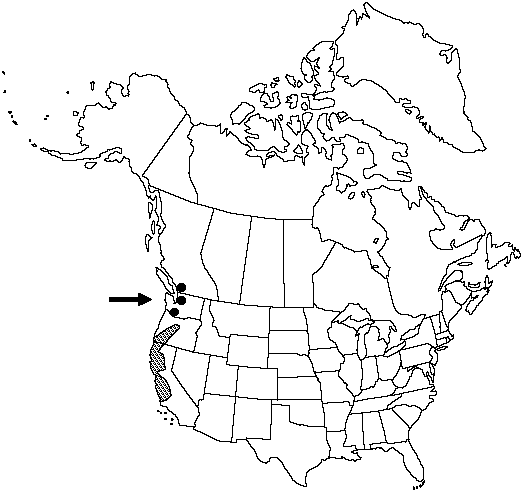Difference between revisions of "Polystichum californicum"
in Engler & Prantl,Nat. Pflanzenfam. 1(4): 191. 1899.
FNA>Volume Importer |
FNA>Volume Importer |
||
| Line 23: | Line 23: | ||
}}<!-- | }}<!-- | ||
| − | --><span class="statement" id="st- | + | --><span class="statement" id="st-undefined" data-properties=""><b>Stems </b>erect or ascending. <b>Leaves</b> monomorphic, arching or erect, 2–8 dm; bulblets absent. <b>Petiole</b> 1/5–1/3 length of leaf; scales light brown, abruptly diminishing in size distally, falling off early distally. <b>Blade</b> lanceolate to linear-lanceolate, 1-pinnate-pinnatifid, base slightly narrowed. <b>Pinnae</b> oblong to lanceolate to falcate, shallowly to deeply divided, pinnae overlapping or not, in 1 plane, 2–10 cm; base oblique, acroscopic auricle lobed; margins not incised to costae, serrulate-spiny with teeth ascending; apex acute-attenuate, subapical and apical teeth same size (southern form) or obtuse and cuspidate with subapical teeth smaller than apical teeth (northern form); microscales filiform, dense abaxially, sparse adaxially. <b>Indusia</b> ciliate. <b>Spores</b> brown. <b>2n</b> = 164.</span><!-- |
-->{{Treatment/Body | -->{{Treatment/Body | ||
| Line 54: | Line 54: | ||
|publication year=1899 | |publication year=1899 | ||
|special status= | |special status= | ||
| − | |source xml=https://jpend@bitbucket.org/aafc-mbb/fna- | + | |source xml=https://jpend@bitbucket.org/aafc-mbb/fna-data-curation.git/src/9216fc802291cd3df363fd52122300479582ede7/coarse_grained_fna_xml/V2/V2_199.xml |
|genus=Polystichum | |genus=Polystichum | ||
|species=Polystichum californicum | |species=Polystichum californicum | ||
| − | |||
| − | |||
| − | |||
| − | |||
| − | |||
| − | |||
| − | |||
| − | |||
| − | |||
| − | |||
| − | |||
| − | |||
| − | |||
| − | |||
| − | |||
| − | |||
| − | |||
| − | |||
| − | |||
| − | |||
| − | |||
| − | |||
| − | |||
| − | |||
| − | |||
| − | |||
| − | |||
| − | |||
| − | |||
| − | |||
}}<!-- | }}<!-- | ||
-->[[Category:Treatment]][[Category:Polystichum]] | -->[[Category:Treatment]][[Category:Polystichum]] | ||
Revision as of 14:13, 27 July 2019
Stems erect or ascending. Leaves monomorphic, arching or erect, 2–8 dm; bulblets absent. Petiole 1/5–1/3 length of leaf; scales light brown, abruptly diminishing in size distally, falling off early distally. Blade lanceolate to linear-lanceolate, 1-pinnate-pinnatifid, base slightly narrowed. Pinnae oblong to lanceolate to falcate, shallowly to deeply divided, pinnae overlapping or not, in 1 plane, 2–10 cm; base oblique, acroscopic auricle lobed; margins not incised to costae, serrulate-spiny with teeth ascending; apex acute-attenuate, subapical and apical teeth same size (southern form) or obtuse and cuspidate with subapical teeth smaller than apical teeth (northern form); microscales filiform, dense abaxially, sparse adaxially. Indusia ciliate. Spores brown. 2n = 164.
Habitat: On forest floor in southern part of range and in rock crevices at cliff bottoms (most commonly andesite) to north
Elevation: 100–850 m
Distribution

B.C., Calif., Oreg., Wash.
Discussion
Polystichum californicum is restricted to the Coast Ranges and the Sierra-Cascade axis. It is most abundant in the Coast Range north of San Francisco.
Polystichum californicum is an allopolyploid, the evolutionary roots of which include P. dudleyi as the 2-pinnate ancestor. Morphologic and ecological data indicate P. imbricans is ancestor to the northern forms and P. munitum is ancestor to southern forms, suggesting P. californicum is an amalgam of interfertile tetraploids with polyphyletic origins (D. H. Wagner 1979). Cytological analysis corroborates this (A. D. Callan 1972; W. H. Wagner Jr. 1973), but chloroplast DNA studies have detected only the involvement of P. imbricans in the ancestry of P. californicum (P. S. Soltis et al. 1991).
The more xeric, rock-inhabiting members of the complex (showing the parental influence of P. imbricans) occupy the northern half of the range whereas plants of more mesic habitats are found to the south. Hybrids with both P. dudleyi and P. munitum are found frequently, because these three species are often sympatric (W. H. Wagner 1973). The hybrid with P. dudleyi (a triploid) will key to that species. The hybrid with P. munitum resembles a less-incised form of P. californicum with aborted sporangia. Polystichum californicum × imbricans has been found only once, in Oregon (A. D. Callan 1972). Another hybrid that will key here, based on its overall appearance, is P. munitum × scopulinum. It lacks filiform microscales and also has malformed sporangia. Such a specimen was the basis of the report of Polystichum californicum in eastern Washington (C. L. Hitchcock et al. 1955–1969, vol. 1). The sterile diploid hybrid between P. dudleyi and P. munitum is indistinguishable from P. californicum except for aborted sporangia and chromosome number (W. H. Wagner Jr. 1973).
Selected References
None.